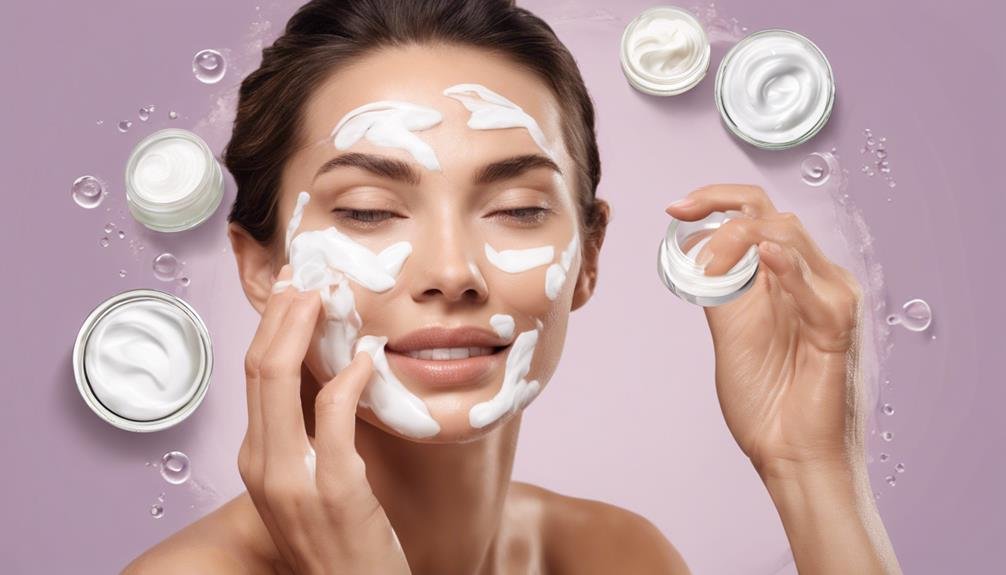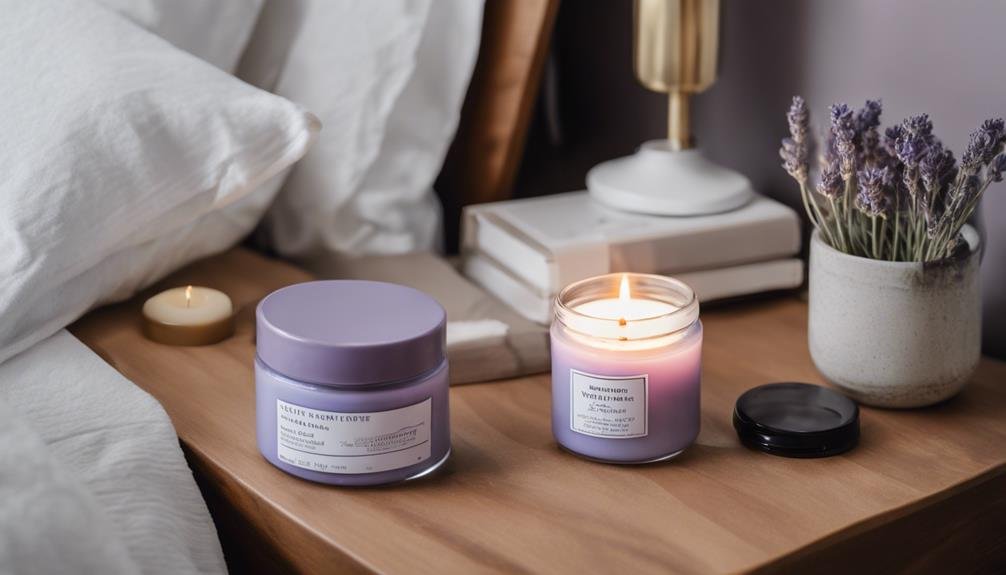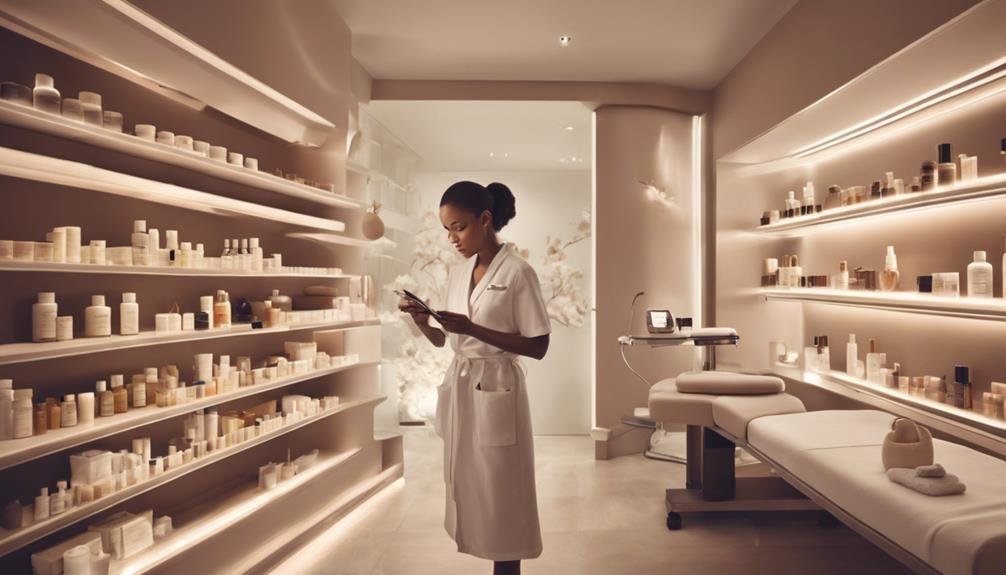Imagine your skin as a delicate canvas that requires gentle attention and nourishment to maintain its vibrancy and resilience. But what if your current skincare routine is missing a crucial step that could unlock your skin's true potential? By exploring the fundamentals of proper skincare and incorporating simple yet effective practices into your daily regimen, you may uncover the key to unlocking healthy, radiant skin that glows from within.
Key Takeaways
- Choose suitable cleansers for your skin type to remove impurities effectively.
- Regularly exfoliate to reveal brighter skin and improve product absorption.
- Hydrate skin with water, moisturizers, and a balanced diet rich in antioxidants.
- Protect your skin from UV rays with SPF and prioritize quality sleep for skin repair.
- Manage stress, exercise, and maintain a consistent skincare routine for healthy skin.
Cleansing
When it comes to maintaining healthy skin, cleansing is a crucial step in any skincare routine. Cleansing helps remove dirt, oil, makeup, and other impurities that can clog pores and lead to breakouts or dull-looking skin. Choosing the right cleanser for your skin type is important. If you have oily skin, opt for a foaming or gel cleanser to help control excess oil production. For dry skin, a creamy or hydrating cleanser can prevent stripping away natural oils. Sensitive skin benefits from gentle, fragrance-free cleansers to avoid irritation.
To effectively cleanse your skin, start by wetting your face with lukewarm water. Apply a small amount of cleanser to your fingertips and gently massage it onto your skin in circular motions. Rinse thoroughly with water and pat your face dry with a clean towel.
It's recommended to cleanse your face twice daily, in the morning and evening, to maintain healthy skin. Remember, proper cleansing sets the foundation for the rest of your skincare routine, ensuring that your skin can better absorb the benefits of subsequent products.
Exfoliating
Exfoliating is a key step in a healthy skincare routine that helps to slough off dead skin cells, revealing a smoother and brighter complexion. By gently scrubbing the skin's surface, exfoliation promotes cell turnover, unclogs pores, and allows for better absorption of skincare products.
There are two main types of exfoliants: physical exfoliants, like scrubs or brushes, and chemical exfoliants, such as alpha hydroxy acids (AHAs) or beta hydroxy acids (BHAs).
When choosing an exfoliant, consider your skin type. Sensitive skin may benefit from a gentle chemical exfoliant, while oily skin could benefit from a stronger formula. It's essential to exfoliate no more than 1-3 times per week to avoid irritation. Over-exfoliation can strip the skin of its natural oils and lead to increased sensitivity.
Moisturizing
To maintain healthy skin, moisturizing is a vital step in your skincare routine. Moisturizers help to hydrate and nourish your skin, preventing dryness, flakiness, and irritation. When choosing a moisturizer, opt for one that suits your skin type – whether it's oily, dry, combination, or sensitive. Look for ingredients like hyaluronic acid, glycerin, or ceramides, which help to lock in moisture and strengthen the skin's barrier.
Applying moisturizer twice a day, in the morning and evening, can help keep your skin supple and smooth. After cleansing your face, gently pat it dry and then apply a pea-sized amount of moisturizer using upward strokes. Focus on areas that tend to be drier, like the cheeks and forehead, but don't forget about the neck and décolletage.
Regular moisturizing can also help reduce the appearance of fine lines and wrinkles over time. Remember, a well-moisturized skin is a healthy skin.
Sunscreen
Protecting your skin from the sun's harmful rays is essential for maintaining healthy skin. Sunscreen is a crucial tool in your skincare routine to shield your skin from the damaging effects of UV radiation. It helps prevent sunburn, premature aging, and reduces the risk of skin cancer.
When choosing a sunscreen, opt for a broad-spectrum formula with an SPF of 30 or higher to ensure protection against both UVA and UVB rays.
Apply sunscreen generously to all exposed skin, including your face, neck, ears, and hands, at least 15 minutes before heading outdoors. Reapply every two hours, or immediately after swimming or sweating.
Remember that UV rays can penetrate through clouds and windows, so sunscreen is necessary even on cloudy days or when indoors near windows.
Incorporating sunscreen into your daily skincare regimen is a simple yet powerful way to safeguard your skin's health and preserve its youthful appearance. Make it a habit to prioritize sunscreen application to promote long-term skin wellness.
Hydration
For optimal skin health, maintaining proper hydration levels is crucial. Hydration plays a fundamental role in keeping your skin looking vibrant and healthy. When your skin is dehydrated, it can lead to a dull complexion, dryness, and even exacerbate the appearance of fine lines and wrinkles.
To ensure your skin remains hydrated, aim to drink an adequate amount of water daily. The general recommendation is about 8-10 glasses per day, but individual needs may vary. Additionally, using a moisturizer that suits your skin type can help lock in moisture and prevent water loss from the skin.
Incorporating hydrating ingredients like hyaluronic acid and glycerin into your skincare routine can also boost your skin's hydration levels. These ingredients attract and retain moisture, leaving your skin feeling soft and supple. Remember, hydrated skin is healthy skin, so make it a priority to keep your skin well-nourished and moisturized from the inside out.
Healthy Diet
Maintaining healthy skin goes beyond just external hydration; what you consume also plays a significant role in the overall health and appearance of your skin. A healthy diet rich in essential nutrients is vital for glowing skin.
Foods high in antioxidants, such as berries, spinach, and nuts, can help combat free radicals that contribute to skin aging. Omega-3 fatty acids found in fish like salmon and walnuts help maintain skin elasticity and hydration.
Vitamin C from citrus fruits boosts collagen production, promoting skin firmness. Additionally, drinking an adequate amount of water is crucial for skin hydration and overall health.
Conversely, a diet high in processed foods, sugars, and unhealthy fats can lead to inflammation, acne, and premature aging. Limiting sugary snacks and opting for whole foods like fruits, vegetables, and lean proteins can improve your skin's health.
Sleep
Adequate sleep is a crucial component of maintaining healthy skin. When you don't get enough rest, your body can't repair and regenerate effectively, leading to dull and tired-looking skin. During deep sleep stages, the body boosts blood flow to the skin, allowing for better absorption of nutrients and oxygen. This process helps repair damage from UV exposure and pollution, promoting a youthful complexion.
Lack of sleep can disrupt the balance of key hormones like cortisol, which can trigger inflammation and break down collagen, leading to premature aging. Additionally, insufficient sleep can result in under-eye circles, puffiness, and a lackluster complexion. Aim for 7-9 hours of quality sleep each night to support skin health and overall well-being.
Establishing a bedtime routine, creating a calming sleep environment, and limiting screen time before bed can help improve your sleep quality. Prioritize restful sleep to wake up with a refreshed and radiant complexion.
Stress Management
To effectively manage stress for optimal skin health, it is essential to recognize the impact that emotional well-being has on your skin's appearance and overall condition. Stress can trigger various skin issues such as acne, eczema, psoriasis, and premature aging. Implementing stress management techniques is crucial for maintaining healthy skin. Here are some strategies to help you manage stress effectively:
| Stress Management Techniques | Description | Benefits |
|---|---|---|
| Deep Breathing | Inhale deeply through the nose, hold for a few seconds, and exhale slowly through the mouth. | Reduces cortisol levels, promoting skin healing. |
| Meditation | Practice mindfulness to calm the mind and reduce stress levels. | Enhances skin's natural glow and radiance. |
| Exercise | Engage in physical activities like yoga or walking to release endorphins. | Improves blood circulation for a healthy complexion. |
Incorporating these stress management techniques into your daily routine can have a profound impact on your skin's health and appearance. Take time to care for your emotional well-being, and your skin will thank you.
Exercise
Incorporating regular exercise into your skincare routine can significantly benefit the health and appearance of your skin. When you engage in physical activity, you increase blood flow, which helps nourish skin cells and keep them healthy. Exercise also promotes the production of collagen, a protein that maintains skin elasticity and firmness. Moreover, sweating during a workout session helps to unclog pores and expel toxins from your skin, giving you a natural glow.
Studies have shown that regular exercise can reduce inflammation, which is linked to skin conditions like acne and eczema. Additionally, the endorphins released during exercise can help reduce stress, which in turn can improve your skin's overall condition. Aim for a balanced routine that includes cardiovascular exercises, strength training, and flexibility exercises to support your skin's health.
Remember to cleanse your skin after exercising to remove sweat and bacteria that could cause breakouts. By making exercise a regular part of your skincare regimen, you can achieve healthier and more radiant skin.
Skincare Routine
Establishing a consistent skincare routine is paramount for maintaining healthy and vibrant skin. Your daily habits play a crucial role in the overall health and appearance of your skin. Here are some essential steps to include in your skincare routine:
- Cleansing: Gently cleanse your face twice a day to remove dirt, oil, and impurities that can clog pores.
- Exfoliating: Regular exfoliation helps to slough off dead skin cells, revealing a smoother complexion.
- Moisturizing: Hydrate your skin with a suitable moisturizer to maintain its elasticity and prevent dryness.
- Sun Protection: Apply a broad-spectrum sunscreen with an SPF of 30 or higher daily to protect your skin from harmful UV rays.
- Healthy Lifestyle: Incorporate a balanced diet, adequate hydration, and sufficient sleep into your routine to support your skin's health from the inside out.
Professional Help
For optimal skin health, seeking professional assistance can be a wise decision. Dermatologists and estheticians have the expertise to assess your skin's unique needs and provide tailored treatments that can enhance its overall health and appearance.
| Benefits of Professional Help | Emotional Impact |
|---|---|
| Personalized treatment plans | Feel valued and understood by skincare experts |
| Advanced skincare technology | Experience cutting-edge solutions for your skin concerns |
| Professional advice and guidance | Gain confidence in your skincare routine |
| Monitoring skin changes over time | Feel secure knowing your skin is in good hands |
| Addressing specific skin issues | Find relief from persistent skin problems |
Consistency
Interested in achieving healthy, radiant skin? Consistency is key when it comes to taking care of your skin. By following a regular skincare routine, you can maintain the health and appearance of your skin over time. Here are some tips to help you stay consistent in your skincare efforts:
- Establish a Routine: Develop a daily skincare regimen that includes cleansing, toning, moisturizing, and applying sunscreen.
- Stick to It: Make a commitment to follow your skincare routine every morning and night without fail.
- Choose Quality Products: Invest in skincare products that are suitable for your skin type and address your specific concerns.
- Track Your Progress: Keep a skincare journal to monitor any changes in your skin and adjust your routine accordingly.
- Seek Professional Advice: Consult a dermatologist or skincare specialist for personalized recommendations and guidance.
Frequently Asked Questions
Can Stress Affect Skin Health?
Yes, stress can impact skin health. It can lead to various issues like breakouts, dullness, and accelerated aging. Stress triggers inflammation and hormone imbalances, affecting skin negatively. Prioritize stress management with self-care practices for healthier skin.
How Does Pollution Impact Skin?
Pollution can negatively impact your skin by clogging pores, leading to breakouts, dullness, and premature aging. Airborne pollutants like particulate matter and chemicals can cause inflammation and oxidative stress, damaging your skin's barrier function.
Does Genetics Play a Role in Skin Health?
Genetics significantly influence skin health. Key factors like collagen production, hydration levels, and sensitivity can be inherited. Understanding your genetic predispositions can help tailor your skincare routine for optimal results. Embrace your unique skin traits.
Is It Necessary to Change Skincare Products Regularly?
You should change skincare products regularly to address changing skin needs, avoid product buildup, and prevent skin sensitivity. It's essential to adapt your routine based on factors like seasonal changes and skin concerns.
Can Certain Medications Affect Skin Condition?
Taking certain medications can indeed impact your skin condition. Medications like steroids, antibiotics, and antihistamines may cause dryness, acne, or sensitivity. Consulting a healthcare provider can help manage these effects for healthier skin.
Conclusion
In conclusion, prioritizing proper skincare practices and healthy lifestyle habits is essential for achieving radiant skin. By consistently following a skincare routine, staying hydrated, exercising regularly, and protecting your skin from harmful UV rays, you can maintain a healthy and glowing complexion. Remember, taking care of your skin is an investment in your overall well-being and confidence. Keep up the good work, and continue to nurture your skin for a luminous appearance.







